Wayne C. Allen's Blog, page 8
May 5, 2024
Whole Being — Self-centered as Compared to Selfish

Self-centered as compared to selfish — we need to learn to find our focus, and to bring it gently back to learning all there is to know about ourselves
 Psst! Hey!
Psst! Hey!** Want more great writing designed to help YOU to shift your behaviour?
** Want to learn how to find, build or deepen your principal relationship?
** Want to know more about Zen living and being?
 I’m the queen of my world!!
I’m the queen of my world!!In keeping with this series of articles, let me do a quick comparison of terms.
What I’m talking about here is one’s “locus of attention” — the place where the person “lives.”
Before I move to the two above, let me also say that by self-centered I’m differentiating from “other-centered.”
There’s a reason for thinking about this — and the selfish part comes into play in our programming as children.Let’s define the three terms:
Self-centered: “I like ice cream. I have a quart of Chunky Monkey , and I’m going to have some now, as I love it. Would you like some too?”
, and I’m going to have some now, as I love it. Would you like some too?”
Other-centered: “I like ice cream, but I know you like it more. There’s not much Cherry Garcia left, so you take all of it.”
left, so you take all of it.”
Selfish: “I like ice cream, and not only am I going to eat my Vanilla HEATH® Bar Crunch Ice Cream, I want yours, too.”
About SelfishnessWe condition children to fit into society, and most parents pretty ruthlessly try to eradicate selfishness.
My parents’ generation simply stopped their kids from doing what they pleased by using threats. That created a couple of generations worth of people who see as their life’s mission to make up for lost time.
We have multitudes of “boomers” running around grabbing a hold of anything that isn’t nailed down, and using crow bars on the things that are.
Often, such people are the ultimate capitalists.“I want, I deserve it all” is their motto. This was crystallized in the 80’s in the mantra, “You can have anything you want.”
And of course, there’s a paradox here. There is enough. For everyone. The problem with selfishness is, the selfish person doesn’t know when they have enough. Not being satisfied with one dish of Triple Caramel Chunk , they want a truck full.
, they want a truck full.
(And yes, I LOVE Ben & Jerry’s Ice Cream!!!)
The cosmos is not kind to those who are greedy and selfish. As is the nature of life, things shift. Things slow down. The creed of the 90’s became, “You can have anything you want. You just can’t have everything you want.”
That was a major counselling issue in the mid-90’s — people wanted to excel in their career, have perfect children and an excellent marriage, and still have time to be a scratch golfer.
They had great trouble grasping the difficulty involved in making even one of these things happen, but because they’d been brought up in a culture obsessed with having and doing everything, they felt incredibly hard done by.
Now, in the 21st century, the rule seems to be, “Unless you are in the 1%, you can’t have everything you want, and maybe you can’t have anything you want.”
Payback time, I guess you’d call it.And then, there’s the Millennials.Not that it’s a good idea, but most people can use entitlement language without blushing, so long as it’s generalized. Most people agree that “people should be successful,” or “everyone is entitled to a bigger house or a larger salary,” or whatever.
It gets more interesting when it’s personal. One of the consequences of “my” generation’s upbringing is that we raised our “kids” to think they were special, Indigo kids, Einsteins in the making. They were given whatever they asked for, and even given what they didn’t.
Many of them became personally entitled. They expect praise because they are breathing. They want rewards for doing the minimum. And it is certainly “all about them.”
People who do not overcome entitlement want more of the pie than what they earn. But perhaps more importantly, they want others to provide the extra pie. Not only are they focused on their own needs and wants, they expect the people around them to actively participate in meeting their wants and needs.
They consider themselves the sun, and everyone else is merely a planet circling around.I remember, some decades ago, working with a nurse who, in the first session, told it that it was my job to see that she didn’t commit suicide. Her friends had been doing that for years, and she’d decided she needed a professional to keep her alive.
When I stopped laughing, I told her that we’d be working on her looking after her own life — if she didn’t want to do that, she could find another therapist.
She was horrified. This was the first time in her entire life that someone wasn’t willing to be manipulated or guilted into put her needs ahead of their own.
After infrequent therapy she quit — saying that she couldn’t continue to work with a therapist who wanted her to stand on her own two feet, without involving others.
About Other-centerednessThe other (dysfunctional) way this can go is that people can be trained not to be selfish by being forced to put the needs of others first. Their life is one trial after another, as they chase their tails trying to be and do what another person wants.
A friend dropped off her 17-year-old at our place, having spent the entire drive berating her for not having her life figured out. Daughter was beside herself. While Darbella hugged her, I said,
“Here’s a secret your mom doesn’t want you to know. You’re going to a party, and she doesn’t want the relatives to hear you don’t have plans for next year, and think she’s a “bad” mom. So she wants you to figure your life out, and tell the relatives, so that others will think your mom is a “good” mom.
All of this is about her, not you.”
We’re not here to be running around doing what other people want us to do. For all you folk that think you’re being a bad kid for not being obedient, it’s time to grow up and be a self-centered adult.
About self-centerednessMy favourite option is finding internal strength and meeting internal needs. In other words, being self-centered. Because, as I often ask,
“Where else would I want my centre to be???”
Being self-centered is all about growing up and standing on our own two feet.
We choose to be with others, to share, to interact, but not out of neediness or the need to be in control.We choose to be alone because we know that, in the end, we nourish ourselves.We choose to focus our attention on our vocations, because we are called to be of service.Our expectation is not to have everything we want, but to be everything that we are.Nothing, not parents, spouses, kids, takes precedence over our need to know ourselves through inter-relatedness and introspection.This is not selfishness nor self-absorption.This is living the quest for self-knowledge and self-responsibility. I may choose to be of service, but it will be by choice, not from guilt.
My life will be lived knowing who I am. My actions will be from desire, not imagined obligation.
This week, think about your motivations, and the location of your centre. If you’ve stuck your centre out there somewhere, draw it back in. If you think others should care about your needs, get over yourself. Clean up your walk.
Facebook TwitterApril 28, 2024
Whole Being — Responsive as Compared to Reactive
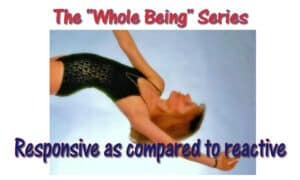
Responsive as compared to reactive — reacting on autopilot is prevalent — always has been. Learning to breathe and then to reflect means that we can respond rather than react.
 Psst! Hey!
Psst! Hey!** Want more great writing designed to help YOU to shift your behaviour?
** Want to learn how to find, build or deepen your principal relationship?
** Want to know more about Zen living and being?

Some years ago I was hanging out with a friend; we were comparing notes about medical procedures. She’d had a sigmoidoscopy the day before.
Aside from a gut ache, she was none the worse for wear.She wondered what the Bodywork perspective would say about her lower digestive tract issues. (Her doctor had told her that she had “Irritable Bowel Syndrome.”
So, I answered her by asking her why she was reluctant to let go of stuff in her life, particularly the “crappy” stuff.
FYI,
She was someone who dwelt obsessively on her past — on her (crappy) upbringing, her (crappy) past relationships, her physical appearance.She also obsessed about her future — she feared making decisions and was reluctant to change anything, lest she hate the result.She said that she had recently called to her boyfriend by saying, “Come here.” “Go away.” “Come here.” “Go away.” When he asked her what was up, she said, “I just wanted to say out loud what I say to you in my head.”
Never satisfied, stuck, grumbly, in pain. And her bowels were pretty much the same.Anyway, we ended up laughing about how much of her behaviour “just seems to happen,” outside of her consciousness, and therefore seemingly outside of her control.
What we are aware of only represents .00001% of the stimulus that hits our brain.Most of us have had the experience of driving somewhere, getting there and not remembering the drive. This is a bald illustration of this process.
The signals are getting to the brain, and the link between brain and eyes, hands and feet operates the car, but it happens behind the scene — out of awareness.
Here’s an experiment: Find a staircase and walk up three stairs, then turn around. Facing down, hold onto the banister. Now, make yourself think about the process of walking down the stairs.
Think about your balance, which muscles have to be contracted or released, how to move your knees, hips, ankles and feet.
Here’s what you’ll discover: If you consciously think about it, chances are that you’ll have trouble going down the three stairs. Give yourself a shake and all will be well.
We have learned not to waste brainpower by endlessly re-remembering day-to-day stuff. You don’t want to have to think about how to brush and floss, or to tie your shoes.
But here’s the issue: marriages or relationships seldom get bogged down over tying shoes. Marriages break down, relationships or work situations break down because we treated the way we interact like we treat tying our shoes.
This is known as relating on auto-pilotWe engage without thinking. We hold a view about how to relate — a pre-conceived notion — locked away in the sub or unconscious, and what we do or say just tumbles out.
We deal with someone’s tone of voice or a situation the same way each time. Just like good little robots.
We react instead of responding.This despite the fact that no conversation has to come out the same, and no situation is ever the same.
When I speak about or write about relationship issues I suggest paying attention, talking honestly with one’s partner, and shifting focus from autopilot to consciously working on relating.
If people do that, they almost always enact a quite different response — a non-auto-pilot response.

No question, people do slide back into auto-pilot. They slide back precisely when they stop paying attention to what is actually happening and go back to “reacting at” as opposed to “responding with” each other.
This is OK, as well as predictable — all they have to do is to remember to start paying attention again.
I once worked with a client, the wife of the pair. She was in the midst of deciding whether to leave the marriage.
He wouldn’t come for therapy, as he had decided that she had all the problems. Never mind that it takes two to make or break any relationship.
Ultimately, he showed up for one session. He tried to move his chair over next to me; he said he would help me “fix” his wife.
He was quite upset when I made him move his chair, while asking him how his own arrogance and single-minded focus had contributed to the ruin of the marriage.
He didn’t get it. He parroted the same words; he blamed her for not doing things his way. He wasn’t at all interested in who she was. He was only interested in changing her into who he wanted her to be.
But, and I stress this, he was not consciously reactive. He’d made a decision, long ago, that he was right and she was wrong. Everything he did was dedicated to proving this point, NOT to improving the relationship.
I just love people like him (not!) — I usually get to the point of saying, “If you are so wise and all-knowing, why have you never had a successful relationship?” Seems to me that wisdom should create results the person actually wants.
Unless he is getting what he wants. A failed relationship so he can feel like a martyr.Today’s concepts are reaction as compared to response. I just thought of another definition.
A reaction always has to do with what was done in the past and is driven by regret or fear of the future.A response , on the other hand, is located in the present moment, and is based upon a current interpretation, while also based upon a principle.Example: You’ve had bad relationships. You react to conflict by replaying past hurts; you then decide to get revenge, and go on autopilot, reacting to everything with aggression.
To change this, you must declare a principle —
“Everything I say and do from now on will be directed toward relating well (from your side, as that’s all you can control.) As a stimulus happens, I stop, remember my principle, and form a response based upon relating well.”
You may not want to, as your reaction is still in place, screaming, “Make the asshole pay!” but you freeze that reaction and choose another way, in the present moment, that mirrors your principle. You do this again and again.
Try paying attention to the way you engage with others, and pay attention to what you say to yourself. Notice how much of what crosses your lips and mind is the same mindless drivel of criticism and judgement.
Then, ask yourself, “What am I trying to accomplish by thinking or saying that?” Ask yourself what your response would be, if your goal was to consciously know yourself and strengthen your relating.
Ask yourself how often your mouth runs off without the active participation of your brain. Shift, and try it another way. Then, do it again. And again.
Eventually, destructive habits can be changed, but only if you pay attention.
Facebook TwitterApril 21, 2024
Whole Being-Focussed as compared to scattered
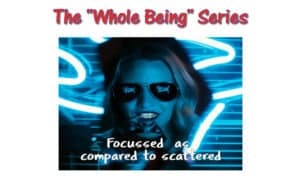
Focussed as compared to scattered — You ever watch people walking along while texting? That’s what scattered looks like. It’s a miracle they survive. Being focussed takes discipline.

My first and most popular book,
This Endless Moment.
Learn to live a full and satisfying life.
I’d been working with a new client; the guy who has learned that his wife is having an affair. She was being pretty blatant about it — she’d even taken off to Europe with him, and had introduced “mister wonderful” to her two grown children.
My client was all over the map with it — and I understand that — after all, he’d never experienced this before. He was a scientist, and he was used to precision, unemotional behaviour and “things making sense.”
His approach has been quite scattered. He’d made demands, and then retracted them. He’d yelled and screamed… then tried tact and diplomacy. He’d worried about losing the house, losing the kids. He’d talked to a slew of his friends, and of course kept getting conflicting advice.
I don’t think he quite “got” me — because no matter how complex he made the situation, I kept suggesting that he say to her:
“I’m not happy with the present situation. I need to know, by (3 weeks later) whether you are willing to work on saving the marriage.”
This approach cuts to the heart of what is actually going on. It pulls all of the scattered pieces together.
He, however, wasn’t buying it.
He was lost in his head, concocting all kinds of scenarios, involving the kids, the community. He spent his days scaring and confusing himself, switching between anger and acting kind and sweet. He hoped that “everything will just blow over.”
The problem with this approach is, it’s a waste of time.His approach might have had a small chance of working, but only if what she wanted was for the marriage to improve.
What he needed, I would argue, was focussed attention on one thing:“What is my wife’s intent?”
We might define:
Scattered: being all over the place, whether physically, mentally, or emotionally. Focussed: being of one “mind.” One self. It’s “being integrated.”There is nothing “wrong” with being scattered. We live in a chaotic, random universe, and sometimes, perhaps often, we need to let our hair down and let go of thinking we can control any of it.
I used to teach businesses and individuals lateral thinking; I don’t know a lot of people who are good at that. Basically, a free flow of ideas end up getting systematized.
The lateral thinking process might appear chaotic or scattered, but it isn’t. While there is an incredibly free flow of ideas and a lot of looking at things from several angles, what’s really going on is what might be called focussed chaos.
It’s not “out of control” — there is structure and meaning in the process. It’s a lot like modern art.
Problems occur when there is undisciplined anything. So we propose structured chaos. In other words, even chaos is beneficial when one remains focussed.
True chaos, on the other hand, often leads to hospitalization.There is an implicit order and direction (a focus) beneath things that actually accomplish something. Being scattered means yielding to whim.
Examples of being scattered:
Running blindly from one thing to another thing.Not attending to the present moment because of the appeal of your fantasies regarding the past, the future, or “what’s wrong.”Not dealing elegantly and directly with relationships because what’s going on in your head doesn’t match what’s going on in the relationship, and you opt for your head, thereby losing the relationship.My preference (neither right nor wrong — just a preference) is for focus. I prefer great flexibility in my thinking and acting, without chaotic or scattered thought or action.
My reason is simple. I choose to be guided by certain flexible principles, not just do whatever crosses my mind.
While I agree with the writers of “Language, Structure and Change”– that “Life is a purposeless drift,” I also agree with David Raithby —
“We may not know where we are going, but we can choose to go in a group.”
Or Ben Wong —
“The facts of your life remain. What you do with those facts is up to you.”
My 42 year focus on growing and deepening my relationship with Darbella, for example, precludes doing things that will complicate matters.
There is great flexibility in our relationship, but the bottom line is that we are committed to a daily walk together. So, I’m not going to pick a fight with her because I’m having a bad day or because I need to be right.
My focus on deepening the relationship precludes my being a jerk and demanding my own way.Focussed attention also applies in the “real world” of problem solving.
Dar and I once spent a day “surviving.” We’d driven north of Sudbury, and stayed with a friend. The guy was a canoeist, and we had our kayaks along, so we’d asked him to set up a paddle for us.
He picked John’s Creek.Following a hydro corridor, he drove us into the bush in a Land Rover. We reached what I would call a river, not a creek. But I don’t live in the North. The sucker was 60 feet wide and ripping along.
He says,
“Hmm. I paddled this creek a month ago. Took me a couple of hours to get to the lake, and then a couple of hours across the lake. But a tornado went through here a couple of days ago. Looks like there’s more water in the system. Watch out for dead-fall from the tornado.”
Undaunted, we pressed on.
Our kayaks are river kayaks. We can’t pack much. We had a first aid kit, basic survival gear, and two meals. And a tarp.

We paddled along, taking in the wilderness. We looked at birds and animals scurrying in the woods. We hit the first dead-fall 30 minutes in.
Last thing you want to do is get pinned to a dead-fall in a kayak in a running river. That will kill you, for sure.
Took us 20 minutes to carefully navigate around it; we managed to do it without leaving the boats.
The next dead-fall was different. A huge tree was down across the whole “creek.” It was sticking out of the river a couple of feet for the entire width of the “creek.” The banks on both sides were not climbable, which meant we had to stay in the kayaks and get past the dead-fall.
I headed to a bank and had a look around. I discovered three things.
1) There was a waterfall 100 feet past the dead-fall.
2) There was a spot after the dead-fall and above the waterfall to pull out the kayaks.
3) There was a huge, bloated, dead moose caught in the dead-fall.
We decided we’d have to crawl out of the kayaks, climb up onto the downed tree trunk, pick up the boats, swing them over the tree and get back in, all without touching the moose.
We did a pile of thinking and talking, then followed through with our plan. (Dead moose smells nasty, in case anyone asks you.)
We slithered out of our kayaks, picked them up, lifted them over the tree, and slithered back in.
We then paddled to the spot where we could get up the bank, got out of our boats, and then portaged the kayaks past what turned out to be a quite large waterfall, perhaps 50 feet high.
We got past the waterfall, but there was no path to take the boats back down. Just a steep embankment.(By the bye, I hope you’re getting the point. What should have been an easy paddle turned into a dangerous obstacle course. While we had a prior plan, actual conditions on the “creek” meant that we had to continually go into lateral thinking to get home. Scattered panic wouldn’t do. Focussed, lateral thinking was a must.)
We sat there a few minutes, weighing our options, which ere limited.
Our only “out” was the “creek”–there wa$no going back.
So, one after another, we climbed into our kayaks, wiggled our butts and got them to tip over the embankment. We slid down, through trees and brush, and crashed back into the creek.
Neither of us wanted to capsize and swim in water downstream of the dead moose, so we managed to keep the boats upright.
I could go on and on, but we stopped for lunch, several dead-falls and another waterfall. No more moose, though. It took us 8 hours just to paddle the “creek.”
Our survival depended, as it does in “real life,” on focus, determination and free thinking.
We paddled another 3 hours across the lake, past the hydro dam, and got to a road. Our friends’ house was 3 kilometers down the road, which meant we had to carry our gear and the kayaks, after paddling 11 hours.
We ended up carrying one together for 100 feet, going back and getting the other, carrying it past the first by 100 feet, going back… you get it.
15 hours after we started, we made it back. Obviously.The wilderness has taught us many lessons, chief of which is the need for focus and commitment.
This week, look at your focus. How often do you lose your focus regarding your relationships, job, path, because your attention wanders and you get “scattered?”
How often do you act rigidly, and miss the way out? How often are you stuck in being right, as opposed to having a flexible focus?
At the end of the day, life’s a purposeless drift. Where you end up, and in what condition, is entirely up to you.
Facebook TwitterApril 14, 2024
On Resisting the Urge to Give Up

On Resisting the Urge to Give Up — the world we see is the one we get to live in. Choose well how to do so!

My first and most popular book,
This Endless Moment.
Learn to live a full and satisfying life.

I suspect that screaming, “I’m bored!” has moved from childhood into what passes for adulthood these days.
There seems to be an epidemic of ennui about, as people pretend that it’s OK to watch from the sidelines as the world disintegrates.
There’s an idea in Tom Robbins’ Even Cowgirls Get the Blues:
One of the characters is a Japanese anti-guru who lives in the hills near the cowgirls’ ranch.
At one point, he’s having a conversation with one of the “girls,” and they’re talking about the state of the world.
He says that the biggest problem facing humanity is “ambulatory catatonia.”
And doesn’t that just seem to be the case?This way of seeing things might just have started with Kierkegaard, who noticed the obvious:
Since boredom advances and boredom is the root of all evil, no wonder, then, that the world goes backwards, that evil spreads. This can be traced back to the very beginning of the world. The gods were bored; therefore they created human beings.
Soren Kierkegaard (1813–55), Either/Or, vol. 1, “Rotation of Crops” (1843; tr. 1987).
Kierkegaard was followed by such notables as Nietzsche, Sartre and Camus; they explored meaning vs. meaninglessness. Thus began the modern existentialism movement, which was a “noticing” of how fundamentally weird the world is.
By the end of World War II, existentialism was at its height. European existentialists thought that nothing could be any worse than, nor a more clear-cut example of, the meaninglessness of life than the destruction caused by WWII. (Little did they know, eh?)
French philosopher Jean-Paul Sartre first gave the term existentialism general currency by using it for his own philosophy. Explicitly atheistic and pessimistic, his philosophy declared that human life requires a rational basis but the attempt is a “futile passion.” Nevertheless, he insisted that his view is a form of humanism, emphasizing freedom and responsibility.
The Encarta — Desk Encyclopedia Copyright 1998 Microsoft Corporation. All rights reserved.

Or, to put it more humorously, this cartoon seems to capture it all: (This cartoon was a part of a t‑shirt collection by a company called Bovis Threads of Kingston, Ont. A web search failed to turn up the company after 1999. They seem to have gone “belly up.”)
The message is a bit hard to read. It says:
I’m not here
You’re not here
Don’t leave a message
There is no beep
The Sartre reference from Encarta contains the seeds of liberation–read the last sentence.
Freedom and responsibility is actually the antidote to the stultifying effects of being human.
Thus, existentialism — in its purest form — makes much sense. Note the following definition of existentialism:
A philosophy that emphasizes the uniqueness and isolation of the individual experience in a hostile or indifferent universe, regards human existence as unexplainable, and stresses freedom of choice and responsibility for the consequences of one’s acts.
Excerpted from The American Heritage Dictionary of the English Language, Third Edition Copyright 1992 by Houghton Mifflin Company.
There are parallels to Buddhism here. Buddhism has no interest in the stories we tell ourselves — life just “is” — we just “are,” and the only sane approach is to first notice, then act.
Existentialists (and Buddhists) reject the notion that life is predetermined and run by something (i.e. god) outside of us. In Buddhism, there is endless causation… things emerge out of what comes before… but everything lacks meaning.
There is NO meaning that is “for all time and for all people.” Instead, we are left with personal understanding (or lack thereof…)
Life is “about,” or “means” whatever I choose it to mean.We hate this.
We want our beliefs to be “what everyone believes.” Some are so insecure that they want someone as meaningless as Trump to enforce their beliefs.
This happens because of our gut sense of meaninglessness is so scary; we don’t want to feel alone, floating aimlessly in a meaningless universe. This is actually what draws Trump followers in so deeply. It’s the Kool-aid of “I’m part of a special group.”
So, how does this relate to ambulatory catatonia, and Resisting the Urge to Give Up?First, the catatonic among us only “get” the first piece of the existentialist paradox:
…the uniqueness and isolation of the individual experience in a hostile or indifferent universe, regards human existence as unexplainable…
As I just wrote, this idea can be scary — that we are cast adrift, alone, in a little boat on a dark and stormy sea. There is no meaning, no direction and no help from “above.”
Giving this reality, three options exist:
fall overboard and drown, stop paddling and tune out (ambulatory catatonia) or enjoy the paddle anyway.My approach to this existential dilemma is contained in the second part of the definition, above:…and stresses freedom of choice and responsibility for the consequences of one’s acts.
Many of us, rather than living in the now, sucking the experience out of life, are still stuck in past relationships and situations, as if frozen in motion.
We obsess and obsess, and nothing changes, except for one thing: the number of days of your life goes down by one, each day. You don’t get ’em back at the end.
To be self-responsibly free is to let go of attachments to the past. It is to let go of obsessing about the future. It is to find this moment, again and again, and to seize the moment and wring the living out of it, swallowing the moment whole, so to speak.
To do otherwise is to stop in your tracks, and plead for rescue, or to freeze and hope that someone is coming to even the score and level the playing field.
In the mean time, life continues apace, never once looking in your direction nor caring how you are doing.
This week, look at how you are fixed in place, by your assumptions, by your fear, by your lack of courage. Then, decide to experiment with leaving ambulatory catatonia and the dread of meaninglessness behind, and live despite it all.
It’s really the only life there is.Facebook TwitterApril 7, 2024
On Cleaning Out the Blame Game

Cleaning Out the Blame Game–There’s nothing particularly helpful about blame. And yet, it seems our minds revel in blame’s appeal. We fill our minds with slights, we tell ourselves how hard-done-by-we are, and we make ourselves victims of the past.
In this article, we look at cleaning out our minds — letting go of what does not work. From this ‘cleaned place,’ new choices emerge.
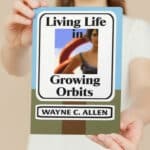
Living Life in Growing Orbits is our workbook.
52 weeks of daily exercises designed to help you figure yourself out.
Check out Living Life in Growing Orbits
It becomes so easy to get caught in the rut of repeating behaviours and activities that either do not work, or used to work and no longer do.
And yet, getting going with something else is tough, because inertia is a complicated thing
Cleaning out old ways of being is an intensive process. It seems to me that most people would prefer to simply change “locations or cast members.”
The problem with this “non-personal” approach is that somewhere between 6 weeks and 6 months, ‘the baggage arrives.’
All of the old, unresolved stuff re-emerges. Same stuff, different location. or context.
I just flashed on that scene in Monty Python’s “Holy Grail” movie.

Arthur confronts the Black Knight. A sword fight ensues. Arthur lops off the guy’s arm. “ ‘Tis only a flesh wound!”
Off goes the other arm, then one leg, then another. After each ‘lopping’ the Black Knight continues to yell and scream about how he’s going to slice Arthur to bits.
Arthur walks off in disgust, leaving a screaming torso in his wake.
You gotta ask yourself — how many limbs does one have to lose (metaphorically) before one is willing to shift the behaviour that caused it?
Here are a few things you could think about “cleaning out.”1. Clean out blaming.
Nothing is happening to you, and no one is the cause of your difficulties.
So long as you think externals are ‘making’ you miserable, you’re going to stay deeply stuck. Instead, think about and implement self-responsible, internal changes.
This will require that you actually look at how you are making yourself sick, miserable, off balance. This is, of course, hard work. It’s much easier to finger point.
If you want your life to be different, you must get your focus back to where it always belongs — on you and your internal dramas. From there, authentic choice is always possible.
2. Clean out guilt.
Being self-responsible means accepting that cause and effect (karma) exists. If you yell at someone, they likely will react with anger (unless they read this blog, in which case they will laugh and suggest you get over yourself ;-))
If you eat and drinkjunk, your body will soon let you know about it. If you don’t pay attention, you’ll trip over stuff.
Most people understand this karmic effect. They then immediately begin a guilt trip aimed at themselves. “You should know better. What an idiot!” The joke is that they think this actually accomplishes something. Guilt is not noble. It’s blaming yourself, and then feeling self-righteous as you beat up on yourself.
Accepting responsibility is” “I did this, and got lousy results, all on my own. From now on, I’ll try other things.”
In other words, drop the guilt and do something different.
3. Clean out personal inertia.
Most of my clients were successful in their careers, less successful in their personal and relational lives.
When we talked, they’d tell me how busy they were, and how hard it was to ‘fit in’ a more centered, meditative, present way of living and being.
Most wanted a short-cut — a technique that they could ‘do.’
I demurred. The last thing I wanted to do is give another ‘doing’ to already over-busy people.
Besides, busyness is just another ploy to keep from changing the important stuff.
Instead, I recommend self-discipline — focusing deeply on the present moment, over and over again.
To be present in the midst of your life.Busyness is another excuse. It’s a variant of blaming. “How could I do anything over the holidays? IT was so busy!”
Where, you might ask, are all of your excuses getting you? It’s time to take complete responsibility for your ‘days,’ your direction, your actions, and your life.
4. Clean out your stories.
Most people are rigidly fixed on their version of their past. They create an ‘abuse story’ and use it to continue to define themselves.
I do not deny that bad stuff has happened to people.
I’m just saying that living out the ‘abuse’ story for the next 20–50 years is a monumental waste of a life.
The whole point of good therapy is to come to a place of acceptance.
There is no way to change your past. No one ever has. It seems to me that what most people do with the past is continue to dredge it up, and then try to get others to admit that, indeed, it was ‘terrible.’
I’m just not sure what this accomplishes, other than to be sure you stay stuck in the past.
Do some therapy, and learn to ‘simply accept.’ This takes practice. However, acceptance means you can finally move on.
5. Clean out your fears.
Fears either define you, or are something you accept and transcend.
If you find that your first thought or sentiment is “I can’t do that!” your fears are dictating your life.
Get this: everyone is afraid of something. This is an element of our humanity.
But you’ll likely have noticed that most of the things you feared have never actually happened. That’s why bad stuff is still called an ‘accident.’
Fear helps us to notice that our body is not comfortable — fear is a ‘security warning.’ Fear ought to elicit our ‘proceed with caution’ program, not the ‘freeze like a deer caught in the headlights of a car’ reaction.
Find a way to confront your fear in the only functional way — proceed carefully to do something. Experiment. Push your fear boundary.
The common theme above is this: blaming gets us nowhere. Labeling ourselves and others is not particularly helpful, either. This year, watch your mind scramble to blame and name, have a little laugh, and let go of clinging to your mind’s chatter. Instead, play with simple, elegant, new ways of being.
Facebook TwitterMarch 31, 2024
On Not Being You

On not being you — of course you’re you. But only in one sense. Mostly you’re a process living inside of what you call “you.”
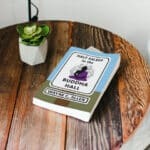
Looking for more on this topic?
Check out my book, Half Asleep in the Buddha Hall.
Wayne’s “Eastern” book takes you by the hand and helps you to find peace of mind. Half Asleep in the Buddha Hall is a Zen-based guide to living life fully and deeply.
Last week I gave you the following quote from a book
called “Bring Me the Rhinoceros”.
Happiness requires a certain surrender. Your unhappiness is threaded through your idea of you. Happiness would overturn some things you know about yourself. Happiness asks, “Are you willing to be a different you?” Or, “Are you willing to be not you?“
John Tarrant, Bring Me the Rhinoceros, pg. 147
I recognize that many of the themes that I present on the blog are in a sense rehashings of things I’ve written about before.
But that quote from last week, when I first read it, kind of stopped me in my tracks. It wasn’t just that it was a clever sentence — and it is — but that it frames the whole thing in a way I’ve never thought of before.
About Letting GoMy clients often used very specific language when addressing what they thought were their issues.They’d say,
“I really need to let go of…” or“I really need to stop holding onto…”And then, they’d give me a list of one or more things that they thought they needed to let go of.They got the drift that there were certain things they were doing that caused their misery. It’s as if they thought that if only they could drop those specific behaviors they might just be happy.
Their experience, however, was that even when they managed to stop one or more of those behaviors, they really weren’t that much more happy or content.
Happiness, it seemed, was always a couple of steps ahead of them.
I recently mentioned about another quote I’d read, where the writer used the term, “cheerful melancholiac.”
I wrote that this perspective fit for me — that my tendency is to be a bit sad, and if I don’t watch myself, sad can turn into really sad, and things can rapidly go downhill from there.
I’ve noticed, over the last few years, that I’ve gotten over myself to a great extent, and don’t sink very far at all into this odd little pit.
It never occurred to me, however, that viewing myself as a cheerful melancholiac was just another choice.It felt so real. Thus my surprise when I read the line, “… to be not you.”
I think, prior to that, I got it intellectually that what was going on in my head — my stories, my emotions, my delusions, and all the other nonsense up there — was no more substantial than bubbles atop a rushing stream.
They sure felt real — and when I was caught in the middle of all the drama, that was all I could see.
I think I now get it: this is just me doing what I normally do — making myself miserable.
While it’s a great improvement to simply let all of that be — to be sad when I’m sad, and not to beat up on myself over it — another, more interesting alternative, would be to really let go.
The way we all go off the rails is by thinking that certain aspects of our personality, emotional or physical condition, or the behaviors we engage in are somehow etched in stone.
Here’s the truth: The contents of my mind, much like the bubbles on water, are just the game my mind is playing. They’re not me.Here’s a quote from the Dalai Lama:
The actual process by which mind creates our unenlightened existence and the suffering we experience is described by Candrakirti in his Guide to the Middle Way, where he states, “An undisciplined state of mind gives rise to delusions which propel an individual into negative action which then creates the negative environment in which the person lives.”
Unenlightened existence [samsara] is getting caught on the wheel of life. We think that what we see is real as opposed to something we make up in our heads.
Although it’s a lot to swallow, everything you see, hear, feel, think, all of this stuff, are simply things going on in your head. The things you see, for example, are nothing more than electrical impulses in your brain.

The real point, the essential point, is to fully understand that how you view the world is how you view the world.
The Dalai Lama has it in the correct order: we go up into our heads and tell ourselves stories, act upon the unsubstantiated stories, and then notice that the world we’ve created fits the stories we’ve created.
And then we say, “See! It’s just like I thought it was.”
Lame eh?
This is what each of us does, this is what each of us has been trained to do. This is me, being me. This is you being you.
Here’s a quote from Pema Chodron:
The process of becoming unstuck requires tremendous bravery, because basically we are completely changing our way of perceiving reality, like changing our DNA. We are undoing a pattern that is not just our pattern. It’s the human pattern: we project onto the world a zillion possibilities of attaining resolution. We can have whiter teeth, a weed-free lawn, a strife-free life, a world without embarrassment. We can live happily ever after. This pattern keeps us dissatisfied and causes us a lot of suffering.
It’s all in our training.
We all know that buying stuff makes us happy, because that’s what the marketers tell us. We all know that we can live happily ever after, because that’s what the movie makers tell us.
And yet, when we try to live this way, we find ourselves bumping our noses against our wants, our needs, and our dramas. We believe that happiness and contentment somehow lies outside of us, and we seek after it like Don Quixote tilted at windmills.
What we believe something is, and what something is,is never the same thing.
Not only do you have to notice the games you play between your ears, but you have to actually do something about them.
I think I can pretty easily get you to watch what goes on in there — certainly we do that when we teach meditation or mindfulness. Doing something about it, or actually not doing something about it, is the tricky part.
Many people think that mindfulness equals calmness. What it actually equals is presence.
Presence means being with whatever is going on, with total awareness, and full permission.Pema Chodron again:
For example, if somebody abandons us, we don’t want to be with that raw discomfort. Instead, we conjure up a familiar identity of ourselves as a hapless victim. Or maybe we avoid the rawness by acting out and righteously telling the person how messed up he or she is. We automatically want to cover over the pain in one way or another, identifying with victory or victimhood.
This would be being you. Being not you would mean simply sitting with the pain, watching the stories go by, and not attaching to any of it. The non-attachment part is a characteristic of the Middle Way.
Another quote:
When we can rest in the middle, we begin to have a nonthreatening relationship with loneliness, a relaxing and cooling loneliness that completely turns our usual fearful patterns upside down.
Cool loneliness allows us to look honestly and without aggression at our own minds. We can gradually drop our ideas of who we think we ought to be, or who we think we want to be, or who we think other people think we want to be or ought to be. We give it up and just look directly with compassion and humor at who we are. Then loneliness is no threat and heartache, no punishment.
 The Middle Way– the world turned upside down
The Middle Way– the world turned upside downThe Middle Way is the balanced perspective. This is how we develop our core. Our self identity expands and loosens. We let go of identifying, not only with what does not work, but also with what does. We are not any of it.
If, for example, I identify with my 30-year-old solid and healthy body, I’m in deep trouble in my 70s.
If I think what happened to me in the past dictates how I am right now, I’m stuck.
If I think what I imagine ought to happen is anything more than the story I’m telling myself, I open myself to disappointment and heartache.
If I watch myself, and watch others, in an openhearted, caring, and detached way, then what is, is what is, I am who I am, and what’s going on becomes a moment in time, as opposed to a life sentence.
Last quote, From Taizan Maezumi Roshi:
Facebook TwitterI am not devaluing thought. I am just mentioning that we shouldn’t mix up the fact of our life with our thoughts about our life. What we think and what actually is–that’s what Buddha talks about as constant change. Anything and everything, constantly changing. That’s the real life, which is, in a way, unknowable. And that unknowable, impersonal no-self–unfixed by any kind of values, attachments, detachments–works perfectly. Knowing nothing, it works completely. That is what this life is. That is what is expressed as no-self. When you don’t see this, suffering is waiting for you. When you see it, there is Nirvana, or peace.
March 24, 2024
On the Tao of Relating
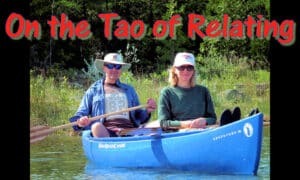
the tao of relating — learning to be clear, to be honest, and to be present with what is.

Looking for more on this topic?
Check out my book, Half Asleep in the Buddha Hall.
Wayne’s “Eastern” book takes you by the hand and helps you to find peace of mind. Half Asleep in the Buddha Hall is a Zen-based guide to living life fully and deeply.
 It’s a Mirror
It’s a MirrorI’m not going to spend a lot of time reviewing the myriad of articles I’ve written over the years, detailing what can and does go wrong in relationships.
The shorthand is pictured in the image–finger-pointing is a symbol for the dance of rightness, correctness, obedience, and manipulation.
There’s an odd expectation that others should be there as we want them to be, doing our bidding, and changing whenever we issue a directive. And when they don’t, out come the histrionics–whatever it will take to break the other person’s resolve.
The best relationships, on the other hand, offer nothing–other than a mirror.
Next week, we’ll be looking at the balance of self-knowing, and I’ve found a pile of new stuff to quote. But one line has stuck in my mind for today’s tome:
Happiness requires a certain surrender. Your unhappiness is threaded through your idea of you. Happiness would overturn some things you know about yourself. Happiness asks, “Are you willing to be a different you?” Or, “Are you willing to be not you?“
John Tarrant, Bring Me the Rhinoceros, pg. 147
I want to talk next week more specifically about what “not being you” might look like. The best way to discover this, I believe, is in relationship.
The Tao of it allThe Tao is the energy of life, the un-named thing that runs like a current through everything. Once you catch a glimpse, you can choose to see with different eyes.
What if it was possible to see things just as they are, and at the same time to drop the judgements, stories, and dramas we normally connect to the things of our life?Mirroring is a technique for reflecting back what you see another doing. In a sense, it’s all about helping your partner see two things:
the issue, and the drama being created over the issue.In a sense, it’s a call back into the present moment, by disconnecting the present issue from the past and future projections.
The idea of self as mirror has its misuses.
One person Darbella and I knew was a master at using mirroring as an escape. We would offer to hold up the mirror for her–so that she might see her sticking points, and immediately she’d say, “That’s your issue which you are projecting (mirroring) on me.”
Our intent was benign–to say, “Are you aware of this?” Her intent was to run quickly away from self examination.
Now, I’ll be the first to admit that my back goes up a bit when Dar says, “You might want to look at what you are setting up there.” I am so invested in my story, my preconceived notion of what is going on, that I have to really work at “just looking, just seeing.”
I want it to be the way I imagine it, as I have my self, my view, and my distress all rolled up in the game.
Distress?Yup. We’ll say more about this next week, but the quote above is a reflection on a line from the Buddha: “Are you afraid of this happiness?”
The happiness he was considering is the Tao–the essential nature of everything. If we are not afraid, then everything is perfect, just as it is. What we see, what we feel, who we are at our cores–it’s all “just as it is, right now.”
OK. I know. You’ve been conditioned to find endless things wrong with yourself and emphatically with everyone and everything around you. You’ve spent a lifetime blaming and finger pointing, and your sense of entitlement and righteous indignation has empowered your life–and your misery.
Giving this up is scary–who will I be if I am not judging everything and finding it wanting?But, it’s a mad, bad worldYup, and right now, in this moment, all there is, is this article and wherever you are sitting. Now, I know. Wars are everywhere, people are dying of starvation, and … Trump. All is grim.
I ask you to look at your suppositions.Philosophically, we can all agree that food for everyone, no disease, and an end to war would be a “good thing.” But think, really think, about your approach to such to such topics.
If such events do not touch you directly, you simply bitch, and moan, and complain about them. You might march, or make a donation, or write your Legislator or MP, but in the end, your griping about the plight of others changes nothing.
It’s just another topic for the weekly bitch-fest down at the local watering hole.
If you do confront any of these issues directly, you know that there is nothing to be gained by griping. You have to deal, immediately and clearly, with whatever it is. The more clarity and directness you can bring to bear, the more likely you will shift things, a lot or a bit.
Most of what you make yourself miserable over is stuff over which you have no control.It’s just up there, rattling around in your head.
I suggest that the point of relationship is to learn more about yourself.Notice when you are up in arms over someone else–how emphatic you can get about how you life is miserable because of others.
In order to find balance you must learn to let go.
This is the real point of relating–to bring someone along for your ride, and to give them permission to really see you, hear you, and witness the foolishness that goes on between your ears.
If you allow yourself to let go of your stories, evasions, blockages, and judgements, you’ll find that things around you simply exist on their own. They are as they are, and they really don’t need you fixing them.
You begin to see the light, the Tao, of everything, and you let them be. You find a deeper sense of self-meaning, as your self is all you can work on directly.
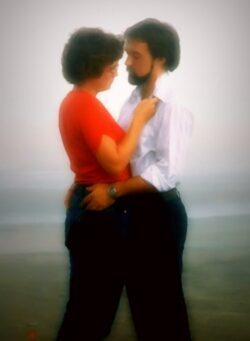 Sometimes, reaching out is reaching in
Sometimes, reaching out is reaching inThen, as you reach out, you find one or two intimate friends–people willing to walk with you, be with you, and emphatically to call you on your foolishness, your blaming, and your games. And you can do the same for them.
Dar and I still bitch and moan. We find all kinds of things not to like about life, about the world, about people we know. We listen to each other as we strip flesh off of the straw dogs we create, and we laugh.
When we make ourselves miserable, we encourage the active expression of the emotion, while clearly denying that the cause is “out there.”
And mostly, we hang out without judgement, listening to each other, laughing with and at each other, and not taking the dramas and games very seriously at all.
This week, examine your relationships. Wonder which ones are worth sustaining, and how many of them you can “just have,” without the stories and misery.
Perhaps, you can let go of the need to make yourself miserable, as you judge, label, and attempt to fix.
You may just find that the end result of dropping the games is an overwhelming rush of happiness. Right here, right now, in this very world, no matter how it appears.
Facebook TwitterMarch 17, 2024
On Change and Choice
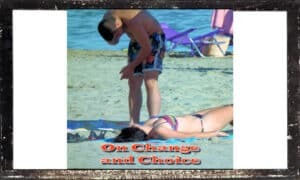
Change and choice are not the same. One is possible… the other is not.
 Psst! Hey!
Psst! Hey!** Want more great writing designed to help YOU to shift your behaviour?
** Want to learn how to find, build or deepen your principal relationship?
** Want to know more about Zen living and being?
This pair of terms are not synonymous. Ben Wong and Jock McKeen talked about the two a lot, and Ben would often say, “Change isn’t possible, but choice always is.“ ‘This is a hard one to swallow, as we’ve all been conditioned to believe that change is not only possible, but essential.
Let’s be clear here: we’re talking about changing our internal predispositions, not, say, something physical. Getting taller as we grew up, for example, is surely a change.
On the other hand, our personalities are set at a young age; our proclivities toward compliance / aggression, cheerful / moody, etc. seems to be wired in. That last one is one I’ve struggled with.
 Melancholy at 22
Melancholy at 22I describe myself as melancholy; I might “do” happy, but that feeling is fleeting.
My “norm” is somewhere right around neutral. And from there, I can and do pulse upward, and can, and have, spiraled downward.
Some time ago, I woke up in a blue mood, and created a terrible morning. Dar and I were due to head off to Spanish class, and I was sure I couldn’t, couldn’t make it.
Darbella, who has seen me in these moods before, reminded me that I could stay home, but stated that she would prefer that I went. I wailed and moaned and gnashed my teeth, and then went.
The first hour was torture; I parsed verbs while contemplating deep and dark thoughts. An hour later, my mood started to lift, and by the end of class, I was ready for pizza.
Now, I’m not making light of depression, of which this was the skinny edge. Been there, done that. I’ve been caught in depression for as long as 5 months–I was as down as far as one can go and survive–numerous times in my adulthood.
In keeping with today’s thought, I just want to say: my nature is neutral to blue to deeper in the hole, and I can’t change that. Not with decades of self-work. Can’t. But I can always choose to get up from my chair of woe, and “go to class,” interact with Dar and others, and see what happens.
In my example, I made a choice, a one-off choice, based upon… well… the choices I’d made in the past.I wrote a booklet about this, BTW; about how to deal with depression (or other things you’d like to do differently.) It’s called “The Watcher,” and it’s available here
Anyway, many are the folk who get stuck on their desire to change, and what with the impossibility of that, they get caught in a cycle of planning, trying, failing, and beating up on themselves.
This happens especially in the early going: they bend their will to their desire to change, and do indeed shift something. Better results! They get all happy and proud of themselves, and then, boom. The old thing returns.
Well, of course it did. Our internal tendencies make up who we are, and a lot of that stuff is ancient, and impossible to unearth, let alone get rid of. Missing in all of this is the simple realization of what happened:
a) identified an aberrant behaviour or belief. b) thought up and alternative, c) implemented the alternative d) got different results e) liked the new results! But! Here comes the error. f) thought the issue had been permanently fixed (that they’d changed.) And… here I am again!
And… here I am again!Nope. All they did was make another choice, and thereby got different results.
The flaw is not recognizing that this new behaviour will have to be consciously applied, each time, forever… or until you die, which ever comes first.
Choice is ongoing, while our stupidities are predictable.
Yup. Nothing creative about us. All we change is the dance partner and the location. The dumbness is consistent. That doesn’t mean we can’t choose another path. Nothing is stopping us from choosing. Except us.
This week, notice how often the things you don’t like about yourself are “just there.” Notice how easy it is to give in and “do the same old shit,” and how often you wish you were different.
Then, have a breath, and ask yourself, “What one thing, right now, can I choose to do differently?” Then! Do. It.
It‘s the Zen of moment-by-moment choice!
Facebook TwitterMarch 10, 2024
On Being Yourself
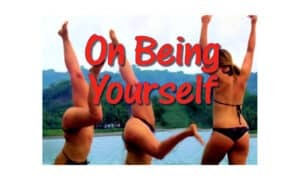
On Being Yourself–you are exactly and only who you are–including what you discover about yourself–the parts tucked away
Of Wayne’s many books, the one closest to today’s topic is: This Endless Moment

My first and most popular book,
This Endless Moment.
Learn to live a full and satisfying life.

Here’s a question I received from a reader:
… I’d be interested in what you might have to say about personal limitations and failure. How do we acknowledge and accept them in a positive way? How do we act within our limits, yet reach beyond our grasp? There seems an inherent contradiction between “setting your mind on anything” and the real, universe-given limitations that we are born with. What does failure mean with respect to all of that?
First of all, people who think you can “set your mind on anything,” assume that there is equality between persons. In other words, that all persons are capable of anything. That we’re all, at some cellular level, the same.
I’ll say more about this in a minute.Ben Wong and Jock McKeen, in their excellent book, The NEW Manual for Life, expand on Karen Horney’s observations, and suggest that the process of socialization causes us to repress that which is not acceptable to those in authority over us (originally, our parents.)
We create a “politically correct” persona, capable of fitting in.
We also create (using Freud’s term) a superego, which Ben and Jock call the Ideal Self.This part of us is never satisfied with who we are, and is like a relentless “good cop/bad cop” drill sergeant. Our Ideal Self urges us ever onward and upward, telling us that we can do anything, be anything; indeed, if we were a decent person, we would already be doing and being more.
The set-up is that we can never do and be everything our Ideal Self wants us to be and do (it’s an ideal, not a possibility).
When we fail, we fall into self-hatred. The voice of this self-hatred is also provided by the superego, which now shifts to the “bad cop” side of the drill sergeant. “You always screw up. You’ll never amount to anything.”
And then, with a sly wink, the “good cop” appears. “Unless, you try harder. You can do anything, you know, if only you’d put your mind to it.”
Missing in this dialogue with our Ideal Self are 2 things:
any sense of the here and now satisfaction of simply being alive, andany chance at having an authentic life.Authenticity is a rare commodity these days. Authenticity comes from an acknowledgement and sharing of the totality of our being, not just the parts we were taught to favour.
And part of that acknowledgement is that we are, to drag back in my first point–emphatically–not equal.
The harpies of political correctness will at this point either excoriate me or unsubscribe.For the rest of you still reading, let’s do some thinking. Right away, some of you are going to get what I’m saying, some are going to struggle, and some are not going to get it. That’s not about the point I’m making–that’s about how our brains work.
My point is not right, nor is it wrong. It is simply my opinion.That you agree or disagree is about how you process the concept I’m presenting. Some people will use logic to check it, others will apply morals (rights and wrongs) to their process of analysis, some will decide that my point is not even worth considering… and others will do… whatever.
A simple demonstration, I contend, of the fact that our minds function differently , and therefore, are not equal.It’s the same with physical attributes. I am my body, just as I am my mind, and all I have to work with is the body I have.
There are things about my body that I can do something about–my weight or strength, for example–and there are things I can’t do anything about–my height, for example.
As an illustration, Darbella and I are well matched in terms of endurance. We have paddled kayaks down treacherous rivers and across lakes for 12 hours, then picked up our kayaks and packs and portaged them 5 km to get to home base. Yes, we were whacked, but there was no sense that we couldn’t do it, no fear of dying in the process.
We’re more like plow horses than racehorses.
This is a characteristic of our physical selves. Some people have more endurance, some less. Not equal.Same thing emotionally. Some people are gifted with a range of emotions, and the ability to express them without blaming. Others are gifted with their entitlements and a list of whom to blame. Both are approaches to the emotional life.
Both, at some level, “work.” They, however, are not equal.
Political correctness has caused these differences to be hotly denied: we give everyone “participation awards” that declare the showing up is the same as excelling. We are cautioned not to offer criticism of someone’s crappy work, lest fragile egos be damaged.
This is silliness in the extreme. We forget that there is only one equality: each of us has the ability to know ourselves and fulfill our destinies (dharma) within the bounds of who we actually are (karma.)Life is not about comparisons to others.
I am in deep trouble if I compare myself to others. If my baseline is to be as good as or better than Joe Blow, I will be caught in comparisons that are impossible. I can’t be like Joe, as we are not equal in intelligence, wisdom, or life-experience. To compare myself (or worse, to want or demand what Joe has) is the height of arrogance and silliness and will lead nowhere I want to go.
This also means that I must (horrors!) take full responsibility for my choices, decisions and directions.Just as there is no one to compare myself to, there is no one other than me to blame for any choice I have ever made. I am where I am and I know what I know based solely upon what I have chosen to learn, to absorb, to assimilate and to find within myself.
So, to answer the question I was asked,
I am here to explore myself and to unearth the totality of who I am.
My goal is to come into a place of acceptance — acceptance of my skill set (as it is, not as I wish it was) my abilities (as they are, not as I wish them to be) and my self (all of me, warts and all.)
From this place of acceptance, I will, as I choose to, push the boundaries of what I know and who I am, learning to include more and more of myself–more and more of the material I blocked.
I do this through dialogue with people I respect, through study, through reflection, through writing, practice and integration.
I will, above all, keep my nose firmly planted on my face and on my side of the fence, judging my successes and failures (of which there will be an abundance — of both) on the only basis that has significance — by comparison to me. I do not succeed when another fails, nor vice versa.
I choose to be in dialogue with a short list of other explorers, and continue to open myself to their stories, their insights and their views, both of their lives and of their sense of me.
In that process of openhearted revelation, I continue to allow myself to explore the depths of the only person I can ever know. Me.
I know that my self-knowledge and contentment is in direct proportion to my honest self-exploration and self-acceptance. No one, no thing, including life, owes me anything.
As in the Zen tale, tiger above me, tiger below me, I am clinging to a breaking branch on the side of a mountain. In front of me, a strawberry. I take it, and I eat. Delicious!
Facebook TwitterMarch 3, 2024
On Being Whole
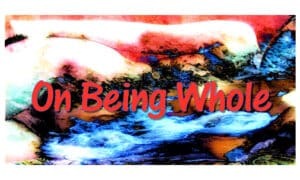
On Being Whole — it’s natural to segment ourselves, but that doesn’t make it helpful. Some ideas on wholeness.

My first and most popular book,
This Endless Moment.
Learn to live a full and satisfying life.
Why, sure!Would you consider writing an article on how we can balance the spiritual side of our lives with the everyday mundane world of making a living? In other words — a blending of the two that allows use to combine both in to living a more fulfilling life?

The short answer is, the issue goes away when you stop thinking of the two as different or mutually exclusive.
Here’s the long answer.In the West, several hundred years ago, during the “Enlightenment,” (a joke, because not many seemed all that enlightened,) both knowledge and “life” got divided.
Prior to the Enlightenment, “the Religious,” (and especially Doctors of Theology) were the only ones educated enough to have “all the answers.”
They had, by fiat, control of the bodies, minds and souls of the populace.With the Enlightenment “Science,” came to the forefront, and we got Doctors of Science, and Doctors of Medicine. As the University gained more power, the Church lost some.
The initial reaction of the Church was simply to excommunicate those who proposed scientific theory that was seen as contradicting the Bible. If the person didn’t recant, they tossed ’em to the Inquisition and declared ’em heretics.
Realizing belatedly that scientific theory was actually verifiable, frying, boiling, flaying and disemboweling became less the preferred method for the Church to express displeasure. The Church, methinks, has much to account for…)
Ultimately, the Church opted to carve things up into sacred and secular.They gave “body and mind” to the Doctors, “the secular world” to the Scientists and “the sacred and the soul” … well, they kept that for themselves.
Back then, the Church pretended that they alone possessed the keys to the kingdom, so the general populace (and fearful scientists) considered the Church to be the arbiter of “the ultimate” — this being accomplished not by logic, but through fear of excommunication.
“The Church” carries much less weight in most circles these days, but the detritus of the past is this — people have trouble dropping the artificial distinction between “spiritual and mundane.”This practice of carving things up to better understand them is a distinctly Western practice. We have created smaller and smaller areas of expertise.
A friend of ours did her PhD. in whale genetics. She was able to figure out the mitochondrial DNA relationship structure within different pods of Wright whales, something no one else had been able to do.
When she presented her dissertation, there were several hang-ups, not the least of which was that there were only 2 whale geneticists in the world who could be trusted to figure out whether her “markers worked.”
Geez, not even enough for a bridge game (unless you invite a whale.)
We have become a culture of experts unable to communicate “across fields of expertise.”As a former member of the clergy, I know how the game is played.
I remember thinking that only clergy could do certain things. I felt a calling (notice the language – called into service, ordained, set apart, etc.) to “be of service,” and I believed that call to be from God. So, I had to go to seminary, get ordained and don the outfit.
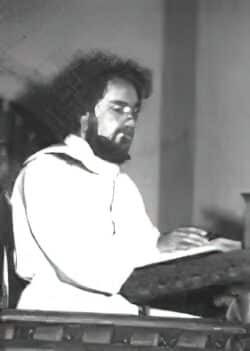 The “mad monk” ca. 1983
The “mad monk” ca. 1983It took me until I was 45 to build up sufficient steam to leave mother church, never to return.
But I had blown off the “division of knowledge” baloney a decade earlier, and I invite you to do the same.
Consider this: in the West, why does there seem to be a short list of “spiritual things” and a long list of the supposedly secular or mundane?
I think that part of the answer is that, in the West, we are human do-ings as opposed to human be-ings.
In the midst of my 2‑year Masters in counselling I went to my supervisor with a question about doing excellent therapy. She sighed and shook her head and said, “You don’t do it, you be it.”
To learn that lesson meant to let go (at that point) of 31 years of conditioning.Our culture tells us that we “do” spiritual things in “spiritual places” and in prescribed “spiritual ways.”
This jibes with the notion that our bodies are at war with our spirits, that sexuality is un-spiritual, that there are “cleans & dirties” and that our secular work is “filthy lucre” — at best, it provides the money to fund the real, spiritual, important stuff.
So, if you want a way around this, here it is. Enact your spirituality in everything you do. Stop carving up your life into compartments. Work on seeing all of life as lush with spirit and soul.This is captured in the Zen and Buddhist and Taoist idea, “chop wood, carry water.”
If I choose to engage with my tasks and with the people I come into contact with in a full, deep, honest, and “soulful” manner, how could this not be described as practicing my spirituality in the world?
If I make the other choice, then I am cutting myself off from my roots for most of my week, just showing up and doing my job, putting in time and wasting my life. And then trying to make up for it with some church here, some prayer there and a little meditation in the morning to help me survive another day of the life I have chosen for myself.
Because here’s the kicker: no one makes us do the job we do. The “I have no choice, I have to work and this is the only job I can do” is simply crap.I, and only I, decide who I am relationship with (and how) and what I do and how I spend the 24 hours per day I’m given.
If I choose to bore myself, anger myself, just put in time, or otherwise fart around with that time, I need only look in the mirror to see who is causing my distress.
I remember back fondly to the original run of Kung Fu, with David Carradine. This was, for many people, a first, somewhat Westernized look at Eastern thought.
What I loved most was watching Kwai Chang Caine enter a town, and immediately get a job. Now, remember, he’s a Shaolin Priest. Yet there he is, week after week, “chopping wood, carrying water.”
And not getting fired, not sleeping on the job, and emphatically not griping about the workload. He just shows up and does his job, and in that process is afforded opportunities to “be of service.”
And that may be what we all need to be: Eastern Westerners/Western Easterners.This week, look at the compartments you artificially create in your life. If you hate your job, get some training or just go do something else. What, you think you have forever? Or if you are making yourself miserable over aspects of your job, change your attitude.
If you think there is a separation of “worlds” that keep you from being who you are, get over this thought.
If you think that there are no lessons to be learned and no light to be shed on the situations and the activities of your life, give your head a shake.
And if you are disregarding your body, your sexuality, your eroticism, your humour – because you think parts of you are un-spiritual, give your whole self a shake.
And then, chop wood, carry water. Celebrate your life and your body as a unified whole.
Because any other story is fragmentary, at best. 



